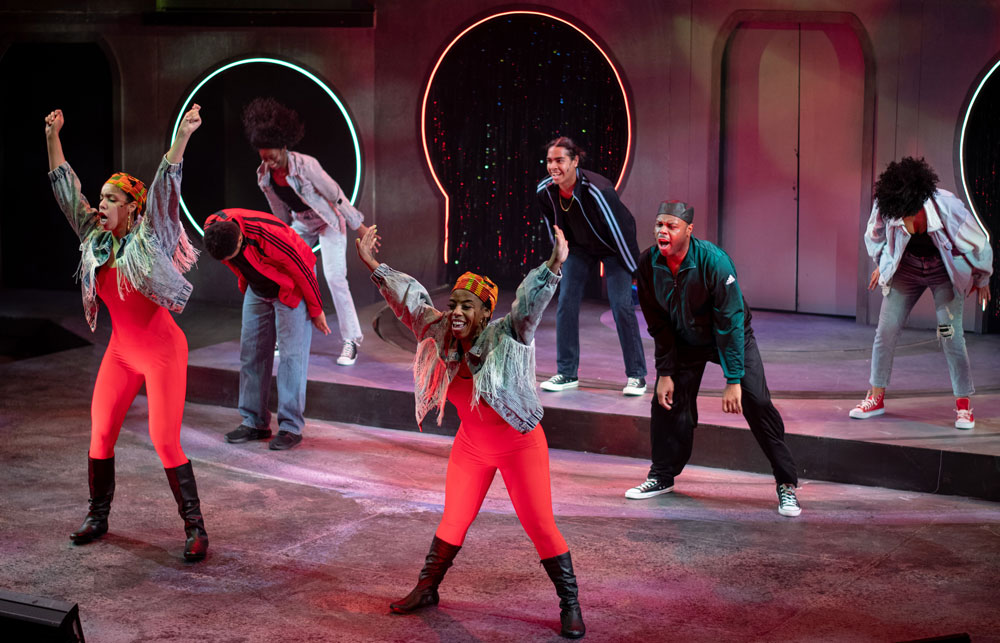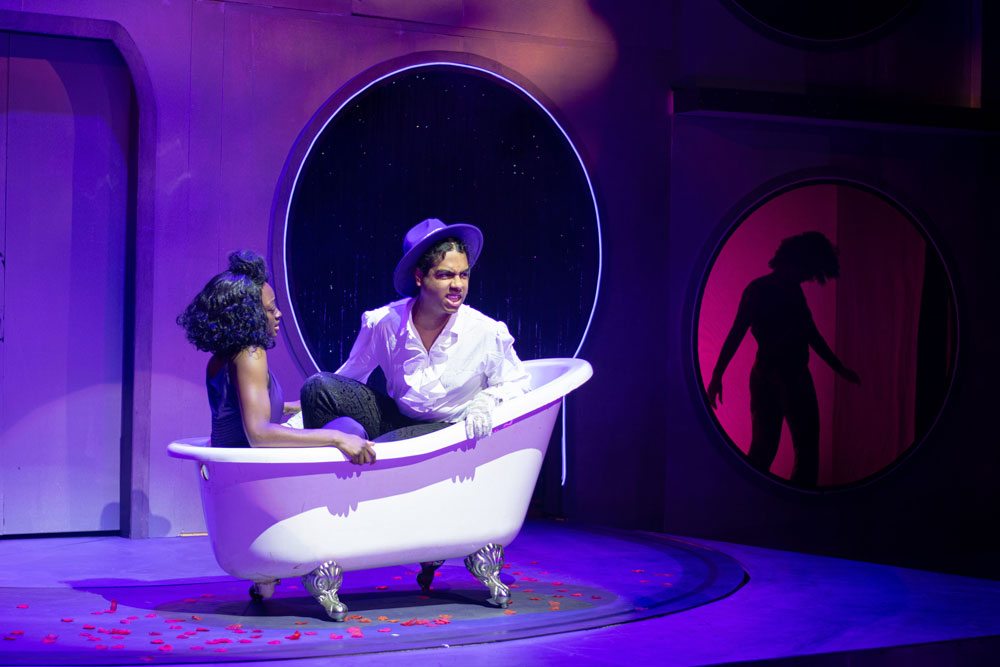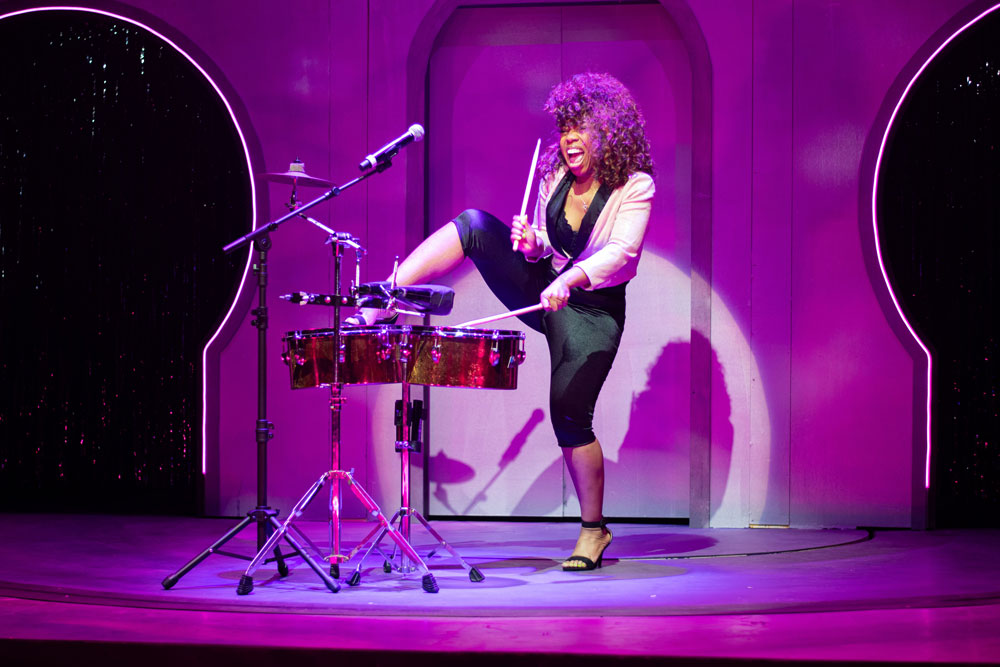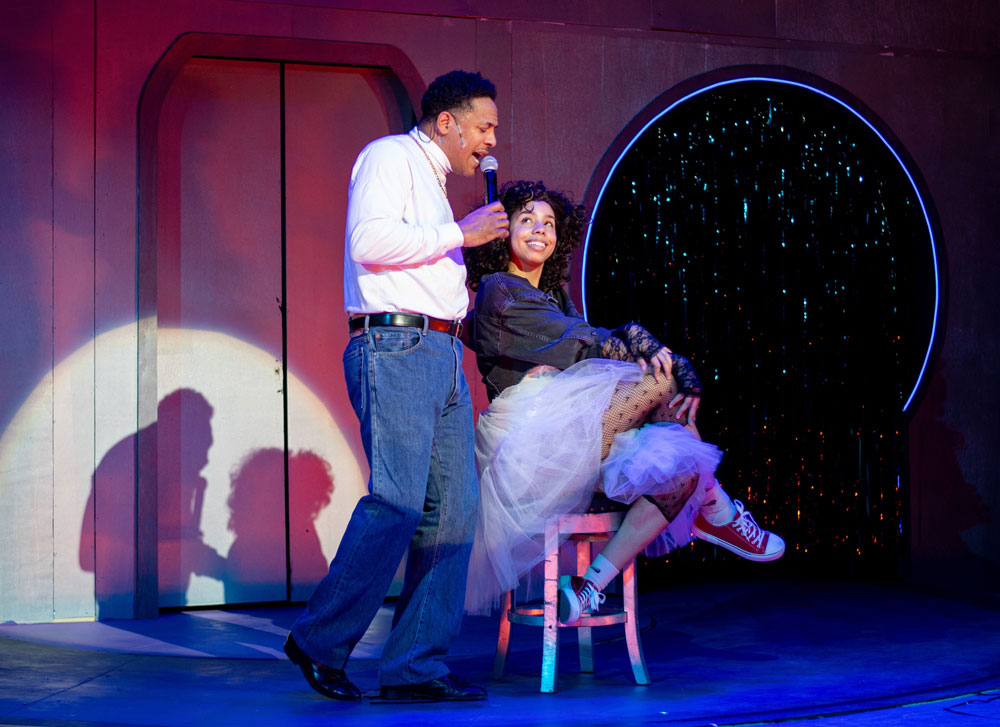
The act of living means that the present takes up most of our mental space. Pursuing careers, raising families and keeping up with the day to day doesn’t leave a lot of opportunity to look back and give adequate measure to what was. Black Ensemble Theater’s (BE) 2024 season opener, The Time Machine: A Tribute to the ‘80s, gives us that luxury with a shimmering musical love letter to a period rich in prodigious talent and its creative expression.
Written and directed by Daryl D. Brooks, it uses a classic approach to lay the groundwork for this rollicking melodic reflection. Assigned to write a high school paper on the music of the ‘80s, 18-year-old Derrick (Brandon Lewis) is stymied and turns to his “weird” Uncle Mike (Thee Ricky Harris) for help. Something of a mad scientist, Uncle Mike also turns out to be one deeply informed musical historian who just happens to enjoy access to a time machine. Possessing galvanizing stage presence, Harris can keep an audience rapt simply by standing still on stage; which may explain why cheers went up the moment he made his initial appearance. In their roles as musical sage and cautiously curious neophyte, he and Lewis have a warm, easy relationship marked by an abundance of spirited spunk. Their bond, authentic and emblematic, carries real appeal. Enhanced by the affable familial connection between an uncle and his nephew, as this tribute started to gel and the power of the music took hold, the veil between the audience and the performance soon began to disappear.

Fast moving and densely packed, the driving energy of The Time Machine kicked off with Soul II Soul’s singular classic, Back to Life; setting loose BE’s trademark vivacity. Somehow there seemed to be an added measure of ebullience filtering through the entirety of this show. Pervasive and potent, it easily flowed out and infected an audience all too ready to celebrate and indulge in a particularly extravagant musical smorgasbord. Wearing his writer’s cap, Brooks insured he inserted ample context to better appreciate the music and understand its origins. That was especially true in the first half of the production. As he introduced his skeptical nephew to songs from well over a generation ago, savvy Uncle Mike would preface nearly each one with a fascinating backstory that shed telling insight on the artist. He’d also explain how their work resonated at the time of their release and how it laid the foundation for artists today. There were plenty in the audience who were well aware of some of those facts and enthusiastically affirmed their truths from their seats.
Ambitiously performing 40 hits that helped shape the decade, The Time Machine’s masterfully curated song list proved both comprehensive and surprisingly enlightening. Prince, Michael Jackson and Madonna were dutifully represented. But so were Keith Sweat, Lisa Lisa, Morris Day, Sheila E. and Bobby Brown. After intermission, those secular preachers who brought the world hip hop, including LL Cool J, Run DMC and Queen Latifah, triumphantly reigned. The breadth of music and artists portrayed meant members of the company’s ensemble performed a plethora of roles. Invariably they’d step into each with the kind of assurance that guarantees splendor. We understand that rising to the role is endemic to the craft; but witnessing such consummate pluck in action remains wonderfully fulfilling for an audience to see.

Denise Karczewski’s amusingly ingenious set played handily into The Time Machine’s pleasure by being the quintessential reminder of the times being honored. A mammoth boom box acted as a floor to ceiling backdrop conjuring sublime images of disco balls and smoke machines. Gigantic speakers doubled as dance platforms and sleek neon lighting resurrected the lure of torrid dance floors. At its center, a revolving stage enabled seamless transitions from storyline to song. When 21st century Derrick reached into his backpack for his iPhone or tablet, the boombox was a reminder that in this time machine, neither of those things exist.

Large, confidently audacious and conceptually stunning, BE’s tribute to the 80s could rightly be viewed as a very impressive ensemble achievement. Granted, notable individual star turns were continually surfacing. Micah Alyce performing Lisa Lisa’s killer of a break up song, All Cried Out, garnered well-earned squeals of “Sing It!”. Jaitee’s take on Bobby Brown was unequivocally smashing. Another BE fan favorite, Vincent Jordan, in his embodiment of both Morris Day and LL Cool J, made these icons of music shine with fresh vitality. And wearing a white fedora and one sparkling silver glove, Brandon Lewis as the King of Pop moonwalked across the stage in effortless perfection. That extra little polish Christopher Chase Carter applied to the choreography boosted the show’s sizzle factor and put the talents of three energetic and versatile back up dancers to the test. BE’s golden chameleon, it’s incomparable band led by Robert Reddrick, provided the platform to make so much magic come to life.
All told, BE’s 80s tribute is a great big party stocked full of wonderful music and delightful talent. Running 2 ½ hours, it requires some investment. But if you have a craving for the delights it has to offer, you’ll find every minute in this time machine blissful and well spent.
The Time Machine: A Tribute to the ‘80s
Through April 14th, 2024
Black Ensemble Theater
4450 N. Clark Street
Chicago, IL 60640
www.blackensembletheater.org